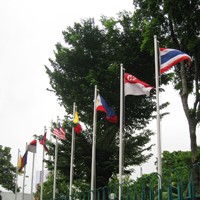Although the tense standoff between Chinese and Philippine warships at Scarborough Shoal in the northern South China Sea has been walked back from the brink, it is a harbinger of more confrontations to come. Indeed, more such incidents are inevitable if China and the four Association of Southeast Asian Nations (ASEAN) member states -- the Philippines, Vietnam, Malaysia and Brunei -- that also claim the sea's disputed islands and their adjacent waters and resources cannot agree on and implement a robust code of conduct to govern their activities there.
Unfortunately, the April 2012 ASEAN Summit in Phnom Penh came and went without agreement on such a code. Indeed, the summit ended not with a bang but with a whimper as far as the South China Sea disputes are concerned.
In the run-up to the summit, expectations ran high that ASEAN would at long last agree on the content, or at least the principles, of a code of conduct. But going in, the Philippines insisted that the code include a provision to separate disputed from nondisputed areas -- a thinly veiled attempt to have ASEAN reject China's historical claim to most of the sea. Starting from the assumption that China's claim is invalid, the Philippine proposal limited the disputed areas to only the islands and outcroppings themselves, a 12-nautical-mile territorial sea around them and, in some cases, an Exclusive Economic Zone where it doesn't overlap with other countries' claims from their baselines -- in other words, little or none. The approach did not pass muster with most of ASEAN's members, however.

